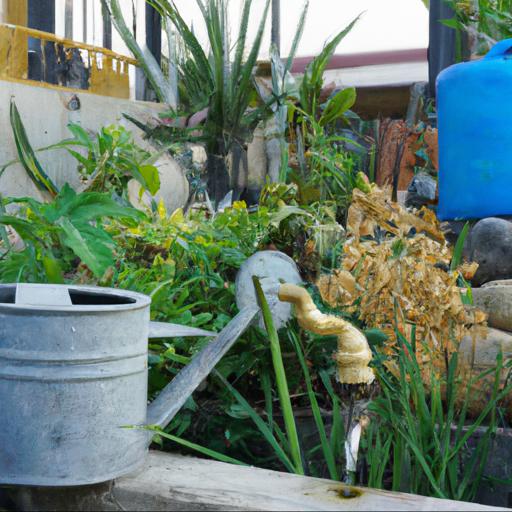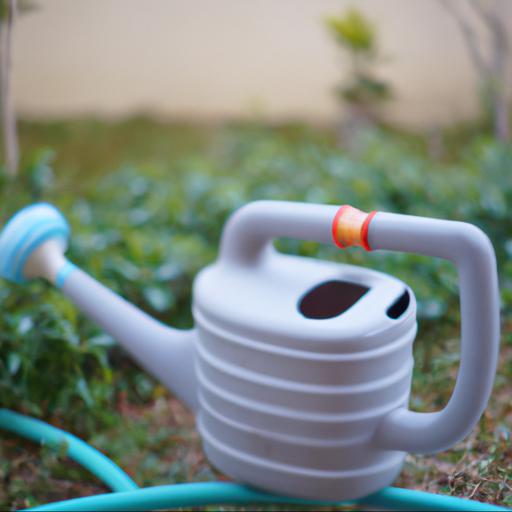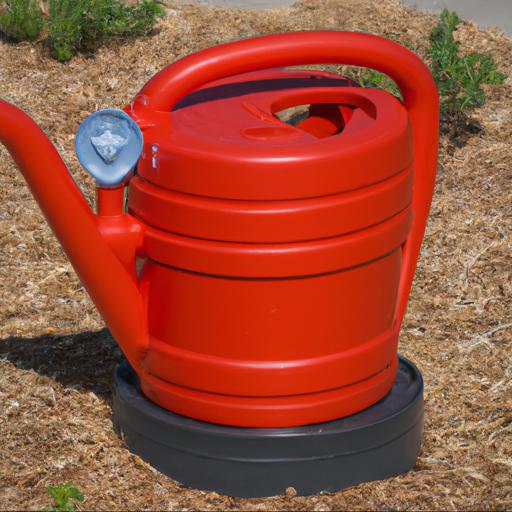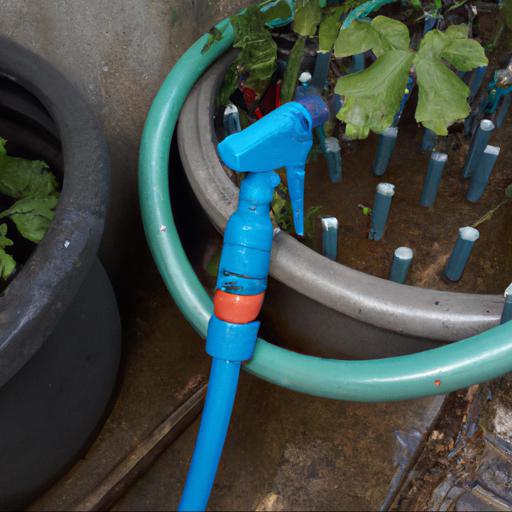Do you want to save water in your garden? It’s easy to do with a few simple steps.
In this blog, we’ll discuss how to save water in the garden and provide tips and tricks to help you conserve water and keep your garden healthy. We’ll look at ways to reduce water usage, such as using mulch and installing a water-efficient irrigation system. We’ll also discuss how to collect rainwater and use it to irrigate your garden.
Finally, we’ll explore the benefits of using native plants and how they can help save water in the garden. With these tips, you’ll be able to reduce your water consumption and keep your garden looking its best.
Tips for conserving water in the garden

Water is an essential part of a healthy garden, but it can also be costly and difficult to conserve. Here are some practical tips from the experts on how to save water in the garden and make sure you have enough on hand for the healthiest plants and grasses.
Start by investing in the right irrigation system. Choose an efficient, adjustable setup that takes into account the local weather and plants’ water needs, like drip irrigation and soaker hoses. These systems have multiple sprayers and spouts you can adjust so you get the right coverage in the right areas.
You can also add rain gauges to help determine how much watering is needed. Regular maintenance of your irrigation system is important too.
This means checking on the heads and valves, inspecting the pipe, and looking out for signs of damage or blockages that might prevent water from getting where it needs to go. You should also check to make sure the spray patterns are set to avoid any overlap or unintended water wastage. Mulching is a great water-saving tip too.
Laying down a thick layer of material like straw, grass clippings, or bark chips helps retain moisture in the soil and reduces evaporation, keeping your plants hydrated for longer. As a bonus, this also helps to suppress weed growth and protect the soil from erosion.
Using water-efficient plants is a great way to make sure you don’t waste any precious water. Stick to drought-resistant varieties such as Sedum, lavender, and Beach Daisy, which need minimal watering and grow happily with less added water. You can also install water-wise turf that is designed to require little upkeep and water.
Finally, consider adding a rainwater harvesting system to your home. This is a straightforward way to provide your plants with recycled water on demand, and it uses rainfall collected from your rooftop or other areas to fill storage containers that supply your garden. With these vital tips, you’ll be able to maintain a healthy and water-efficient garden. By switching up your watering practices and investing in the right products, you can save a lot of water and money in the long run.
Benefits of water conservation in the garden

. As a professional UK garden expert, water conservation in the garden should be top of mind for those looking for a low maintenance, sustainable outdoor space.
Water is an invaluable resource and a precious commodity, especially in today’s increasingly unpredictable weather patterns. Minimising the amount of water we use in our gardens will help to reduce the burden on water resources and limit the amount of pollutants flowing through sewers. When saving water in the garden, the first step is to target any water wastage, such as runoff caused by overwatering and leaking sprinklers, and reduce your water use wherever you can.
There are a range of products and methods available to help you conserve water in your garden, including environmentally friendly ‘water smart’ systems and drip irrigation systems. You should also consider making use of rainwater collection systems to capture and store rainwater, which can then be used to water your plants and garden beds.
By taking steps to save and conserve water in the garden, you can take the burden off our water resources, protect the environment and reduce your monthly bills. Organic mulches, such as wood chips and bark, can help to slow down evaporation and reduce the amount of water needed for your garden, while terracotta soil amendments, such as glazed terracotta, can also be employed to increase water retention. And of course, with less water required, your garden beds and plants will be less prone to problems such as waterlogging.
Remember to check your outdoor water supplies regularly and ensure that there are no leaks, as this can help to further reduce wastage. Taking the steps to save water in the garden is an important part of creating a sustainable outdoor space that is both beautiful and low maintenance.
Implementing the right water saving methods and products will ensure that you have a healthy, vibrant garden that uses minimum water while giving maximum returns.
How to implement water conservation strategies in the garden

The way that people care for their gardens has a big impact on their water consumption. In dry climates conserving water in the garden is a necessity, while in wet climates it’s important to act in ways that help to ensure sustainable water use.
There are a few strategies that gardeners can take to ensure that they’re making wise choices when it comes to the water that they use in their gardens. One way to conserve water in the garden is by engaging in measures such as using rainwater or reclaimed water instead of fresh drinking water to water gardens and other outdoor spaces. If you have access to a cistern or rain barrel, collecting water from rainfall and other sources is an excellent water-saving strategy.
This collected water can then be used in the garden instead of fresh water, allowing you to reduce your overall water consumption. Additionally, if you’re a homeowner, installing low-flow fixtures will also help to reduce your water consumption.
Another great strategy for water conservation is to reduce the amount of turf in your garden. If you have a lot of turf, then you’re likely using a lot of water for irrigation. Replacing the turf with native shrubs and perennials can help to reduce water consumption significantly.
Planting drought-resistant plants such as succulents can also help you to save water as they don’t require as much water as other plants to stay healthy. Additionally, adding mulch to your garden can also help to reduce water evaporation, further helping you to save water. Finally, another strategy that can help you to save water in the garden is to use soaker hoses or drip irrigation instead of traditional sprinklers.
Soaker hoses and drip irrigation systems are designed to reduce water usage by targeting irrigation to specific areas of the garden rather than broadcasting it over a wide area. These systems allow gardeners to water their plants more efficiently and use less water in the process.
Adapting these strategies can help to reduce your overall water consumption and protect your garden from over-watering.
Bottom Line
Saving water in the garden is key to conserving natural resources. Simple steps such as installing a rain barrel, using mulch, and selecting drought-tolerant plants can help reduce water usage in the garden. Additionally, watering plants in the morning or evening when temperatures are cooler can help reduce water loss due to evaporation.
Finally, regularly checking for leaks and ensuring sprinklers are pointed away from hard surfaces can help conserve water in the garden.
FAQ
What are the best ways to conserve water in the garden?
The best ways to conserve water in the garden are to use mulch, water plants in the morning or evening when temperatures are cooler, use a drip irrigation system, use a rain barrel to collect rainwater, and plant drought-tolerant plants.
How can I reduce water waste in my garden?
To reduce water waste in the garden, use water-efficient irrigation systems, such as drip irrigation or soaker hoses, and water plants in the morning or evening when temperatures are cooler and evaporation is lower. Mulch can also help retain moisture in the soil. Additionally, use native plants that are adapted to the local climate and soil conditions, as they require less water.
What are the benefits of using water-saving techniques in the garden?
The benefits of using water-saving techniques in the garden include reducing water consumption, saving money on water bills, and helping to conserve water resources. Additionally, using water-saving techniques can help to reduce the amount of runoff and soil erosion, and can help to promote healthier plants and soil.
What are the most effective methods for collecting rainwater for use in the garden?
The most effective methods for collecting rainwater for use in the garden include installing rain barrels, setting up rainwater tanks, and utilizing rain gardens.
How can I reduce water usage in my garden without sacrificing plant health?
To reduce water usage in your garden without sacrificing plant health, you can use mulch to help retain moisture, use drought-tolerant plants, water in the morning or evening when temperatures are cooler, and use a drip irrigation system.
What are the best plants to choose for a water-wise garden?
Some of the best plants to choose for a water-wise garden include succulents, cacti, drought-tolerant grasses, and native plants.

